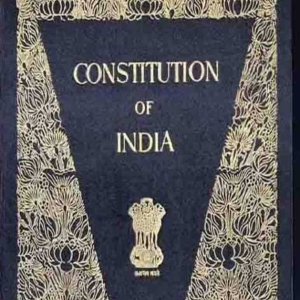
.png) Ram Puniyani
Ram Puniyani

The recent (22 January 2024) Pran Pratishtha (consecration) of Lord Ram in Ram Temple in Ayodhya has been a major spectacle. It was accompanied by mass displays of religiosity in most parts of the country, more so in Northern India. It also saw the fusion of the roles of 'chief of religion' and 'chief of political power' into a single person, the Prime Minister. It was immediately followed by Mr Modi's inauguration of another big temple (Shri Swaminayan) in Abu Dhabi with gaiety and publicity. A couple of days ago, he also laid the foundation for another temple in Chambal, Kalki Dham. Impressed by the serial temple events, many right-wing ideologues claim that Mr Modi is the first statesman from post-colonial societies to move towards decolonising cultures in post-colonial societies.
How did colonialism affect South Asia in particular? South Asia was predominantly a feudal society, ruled by the landlord-kings legitimised by the clergy. The British succeeded in colonising most parts of South Asia, the Indian subcontinent in particular. Their primary focus was plundering its wealth and creating markets for its goods produced in England. It created structures where transport, education and foundations of modern administration were laid down. Incidentally, they also supported the eradication of some of the ghastly practices like Sati. For other reforms, Jyotirao Phule, Savitribai Phule, Ambedkar, and Gandhi, among others, moved mountains to bring in reforms and cultural changes.
The culture of a society is not static. It did start changing in multiple ways during the colonial period. While a blind aping of the West was a small part of cultural change, the major accompanying part was the journey towards a society with equality. These were baby steps towards the culture of the modern industrial society in India. This was looked down upon by the conservative political forces like the Muslim League, Hindu Mahasabha and RSS and communalists as being Western values. They were essentially disgruntled by the journey towards equality of the downtrodden; they were opposed to it and labelled it as being 'Western'.
On these lines, they accused the Indian Constitution, the embodiment of India, of being based on Western values. One recalls that the ideologues of Hindu right were totally opposed to the ideology which talks of equality. In opposition to this, they harp on books like Manusmriti, which encourage inequality of caste and gender. Interestingly, it was those social forces that had roots in feudal power structures that stuck to the 'anti-Western narrative' that collaborated with the colonial rulers.
The Muslim Brotherhood (West Asia) is yet another example. It also tags democratic culture and values as Western import and tries to impose dictatorial norms and social inequality in the name of Islam. In India, the Hindu right-wing seeks to oppose equality as being a Western import. The opposition to the values of the Indian Constitution is masqueraded as an opposition to Colonial culture and propagated as a glorification of 'Indian Culture'. So what is being called opposing colonial culture at times is actually the culture which bases itself on opposing fraternity and justice.
Justice for all, irrespective of caste and gender, has been the goal of the emerging Indian democracy; this gives space to pluralism and diversity. Amongst the post-colonial states, India had the best political journey till a few decades ago. This was also accompanied by a culture which had continuity and change. This was reflected in the propagation of life patterns promoted by Gandhi, Nehru, Bose and Azad, to name a few. It was to tune the culture to be compatible with democratic values.
The spree of temple-related events is accompanied by the assertion that it is decolonisation! Also, the impression being created that the inauguration of the temple in Abu Dhabi is the first one in the 'Muslim countries' of West Asia is totally false. For the uninformed, there are many temples in the region. Temples accompanied global migration. We also recall there are many temples in our neighbouring Muslim countries. Dhakeshwari Temple in Bangladesh is well known, as is the Katas Raj Temple in Pakistan, which was inaugurated by Lal Krishna Advani after its renovation.
The glorification of Modi for ensuring a Hindu temple is unwarranted. To assert that by inaugurating temples in India and Abu Dhabi, Modi is showing the conviction to bring decolonisation is totally misplaced. In India, the colonial impact was undone during the freedom movement itself. The roots of progressive social steps, writings and the theatre ran parallel with the national movement. Post-independence, the process continued with Nehru's encouragement of scientific temper and Ambedkar's well-drafted Indian constitution.
India was never totally subdued by colonial culture. What we are facing today is the promotion of religiosity and conservatism during the last few decades. Since politics is stalking the streets in the garb of religion, our culture is coming under attack from conservative and narrow values. A hilarious example of this is the opposition by BJP associate VHP and company legally challenging the forest department to let the lion Akbar cohabit with the lioness Sita.
As far as Abu Dhabi is concerned, not only Abu Dhabi but the whole of West Asia has suffered the onslaught of orthodox values due to the promotion of Islamic fundamentalism by the United States of America. In pursuit of its control over oil resources, it had overthrown the democratically elected Government of Mosaddegh in Iran in 1953, paving the way for a fundamentalist regime in due course. Later, it was instrumental in propping up Madrassas in Pakistan to train Mujahideen and Al Qaeda with colossal funding and also supplying them with armaments. This whole American intervention pushed the West Asian culture back by centuries. The temple's inauguration in Abu Dhabi cannot undo the cultural damage done to West Asia by the global forces with an infinite 'hunger for oil'.
Temples are one part of the culture. The definition of culture has to be much broader than just temple-related events.